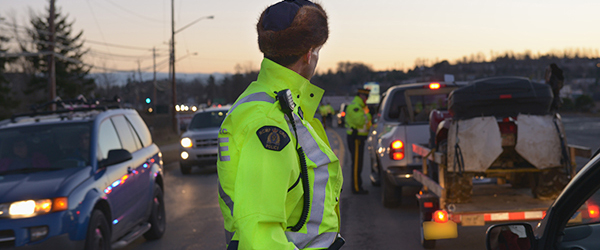Drugged Driving
"We reduced our toxicology capacity immensely. What were you thinking?"
"Now we're going to increase the number of samples we're getting. There's the problem."
Doug Beirness, senior research associate, Canadian Centre for Substance Abuse
"We're talking about two completely different [roadside testing for alcohol as opposed to testing for drugs] animals."
"The reality of the experience of our friends in the States is they have seen an increase [in marijuana use], and there will be an impact on labs across the country."
Superintendent Gord Jones, co-chair, Canadian Association of Chiefs of Police traffic committee
"It should be expected that the number of samples requiring lab analysis will increase dramatically once cannabis is legalized, simply because the police will be reacting to the new regime with a similar approach as they do for driving under the influence of alcohol."
"Roadside checks and random screening of drivers for drugs will likely occur more often."
RCMP request for proposals (RPF)
 |
Health Canada has issued some startling new statistics reflecting an astonishing rise in the number of Canadians who are increasingly being given prescriptions for marijuana for relief from chronic pain, from nausea caused by chemotherapy and every other debilitating illness that causes its sufferers pain and discomfort. September's end in 2016 saw one hundred thousand Canadians with prescriptions in hand, registered to enable them to procure cannabis from a grower licensed by Health Canada.
In September of 2015 the number of people that fit this category was a much more slender 30,537. The year between saw the legalization of large commercial grow operations selling cannabis strictly by mail. The growing awareness of the usefulness of some strains of marijuana in dealing with pain has spread among both patients and their doctors. In response to this emerging situation clinics and information centres whose purpose is to advise patients how they may obtain legal cannabis, point them to cannabis-accepting physicians and offer use-of-product advice, have been opening.
At the same time, pending final legislative approval of the legal use of recreational marijuana, store-front clinics have been popping up all over Canadian cities to serve a drop-in clientele presumably with prescription in hand, although their operation is both premature and illegal at the present time. Area police have responded by raiding some of the cannabis-specialty shops and closing them down. Some proprietors simply re-open them and with seeming impunity.
This free-for-all situation pending legalization is one the federal government does not appear to know how to handle, other than to inform municipalities that they must uphold the law. And the law, at present, is that these sources to obtain marijuana are not licensed to do so, and nor are they regulated, much less operating in a legal environment. And now, the RCMP is anticipating a deluge of requests for proposals over the capacity of the lab system in Canada to advise on a new framework for bodily fluid samples analyzation.
Law enforcement in Colorado, where the state has made marijuana possession legal, has reported increased charges reflecting an increase in the incidence of driving under the influence of drugs. Perhaps not unexpectedly, there have been more traffic deaths as a result of "drugged drivers" since Colorado legalized marijuana. Washington state, which also legalized marijuana use and possession has reported similar trends. And now Canada is anticipating what is certainly destined to occur.
Setting aside the additional issue of keeping legal marijuana out of the hands of young people whose still-developing brains are known to be vulnerable to deleterious effects of marijuana use, law enforcement agencies are now looking at the prospect of increased mayhem on the nation's roads. Where coping with alcohol-impaired drivers has always been an issue, and now drug-impaired driving is promising to add to the situation of unsafe roads. Most people who use marijuana don't recognize it as leading to a temporary brain impairment through delayed responses and danger.
With the recreational use of marijuana legalized, as the current Liberal-led government in Canada has promised, adding to the numbers who use cannabis for health reasons, the situation represents a public danger waiting to be unleashed. Recently, forensic RCMP labs were closed in Halifax, Winnipeg and Regina, the purpose being to save $3.5 million annually in operating expenses. At a time when such labs will be more in use than ever and will find themselves unable to handle all the tests required.
Trained "drug recognition experts" will become the first order of business to handle an anticipated rise in demand to determine whether someone is under the influence of a narcotic when they are suspected of impaired driving. If the determination is in the affirmative, a sample can be requested, and forwarded to a forensic lab for confirmation. Blood samples work as an indication whether drivers have a drug circulating actively in their systems.
While police forces at the present time test with hand-held devices to analyze saliva, whether courts will accept such results as evidence has yet to be determined. The best tool at the disposal of society and the law, however, remains as always, with education. To convince people that marijuana use and driving don't represent a match made in heaven. Unless they're planning to visit heaven prematurely and leave their lives behind and perhaps those of innocent victims of drugged-driving.
 Rian Castillo/CC BY
Rian Castillo/CC BYAfter alcohol, marijuana is the drug most often found in the blood of drivers involved in crashes. Tests for detecting marijuana in drivers measure the level of delta-9- tetrahydrocannabinol (THC), marijuana’s mind-altering ingredient, in the blood. But the role that marijuana plays in crashes is often unclear. THC can be detected in body fluids for days or even weeks after use, and it is often combined with alcohol. The risk associated with marijuana in combination with alcohol, cocaine, or benzodiazepines appears to be greater than that for either drug by itself.
Labels: Canada, Driving Under the Influence, Marijuana

0 Comments:
Post a Comment
<< Home